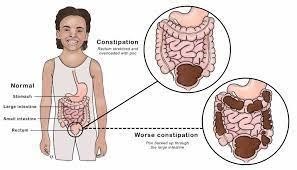A male patient has told a nurse that he occasionally fights constipation. Teaching the patient how to prevent constipation and promote normal elimination, the nurse instructs him to

Take a stool softener or laxative every day until a normal elimination pattern has been reestablished.
Eat small amounts at meals so less waste will need to be expelled.
Eat a minimum of 50 g fiber every day and quickly increase the amount until normal defecation becomes routine.
Drink at least 2000 mL fluid every day, but limit the amount of caffeine to 300 mg.
The Correct Answer is C
Choice A Depending on laxatives or stool softeners every day may lead to dependence and can be harmful in the long term. It is not a preferred approach for managing constipation.
Choice B While eating smaller, more frequent meals can aid digestion, it is not the primary strategy for preventing constipation.
Choice C : Increasing dietary fiber intake is an effective way to promote regular bowel
movements and prevent constipation. Gradually increasing fiber intake helps the body adjust to the increased fiber load.
Choice D Adequate fluid intake is important for bowel health, but focusing solely on fluid intake may not be as effective as increasing dietary fiber to prevent constipation.
Nursing Test Bank
Naxlex Comprehensive Predictor Exams
Related Questions
Correct Answer is D
Explanation
Choice A The supine position (lying flat on the back) is not suitable for administering an enema as it does not facilitate proper flow and retention of the solution.
Choice B High Fowler's position (sitting upright at a 90degree angle) is not appropriate for enema administration, as it might cause discomfort and hinder proper administration.
Choice C Semi Fowler's position (sitting at a semiupright angle) is also not the best option for enema administration, as it may not allow the solution to flow effectively.
Choice D The Sims position, with the patient lying on the left side with the right knee flexed, allows the enema solution to flow downward by gravity and improves retention. It is the best position for enema administration.
Correct Answer is C
Explanation
Choice A For an ileostomy, liquid consistency of stool is expected as the output, and it is not an immediate concern.
Choice B Foul odor from the stool is common with ileostomy output, and while it can be unpleasant, it is not an immediate concern.
Choice C This finding should be reported immediately, as it could indicate bleeding from the stoma or intestinal mucosa, which requires prompt evaluation and intervention.
Choice D Continuous output from an ileostomy is normal and expected, so it is not a cause for immediate concern.
Whether you are a student looking to ace your exams or a practicing nurse seeking to enhance your expertise , our nursing education contents will empower you with the confidence and competence to make a difference in the lives of patients and become a respected leader in the healthcare field.
Visit Naxlex, invest in your future and unlock endless possibilities with our unparalleled nursing education contents today
Report Wrong Answer on the Current Question
Do you disagree with the answer? If yes, what is your expected answer? Explain.
Kindly be descriptive with the issue you are facing.
